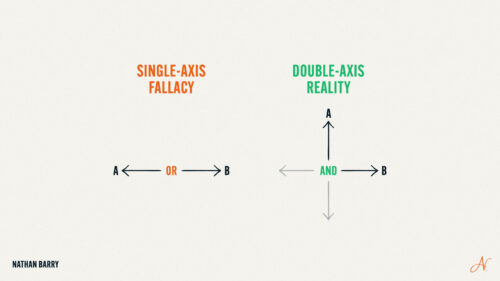A book editor at a major publisher once told me how he reviews fiction book proposals. For non-fiction the standard is to submit a proposal, outline, and a sample chapter (usually the first chapter). But for fiction the author has to submit the complete manuscript.
My response was, “Wow! That’s a lot of books to read!”
But then he explained, with fiction there’s actually a far easier way to know if the book is worth reading: read just the beginning and the end.
When I looked confused he explained further: start by reading just enough in the beginning to get a feeling for who the hero of the story is. Then skip all the way to the end and read enough to get an understanding for who they are now. Are they the same person? Or did they undergo a major transformation and growth?
In a great story the hero will always encounter serious adversity that will change them.
In The Lord of the Rings Sam starts as a bumbling kid and ends the story with the incredible strength and willpower to save Middle Earth. And yes, Sam is the hero of the trilogy, not Frodo.
The Parable of the Mexican Fisherman
You’ve probably read the parable of the Mexican fisherman that inspired so many people to design the life they want. If you haven’t read it, here’s an excerpt from my friend Courtney’s blog:
An American investment banker was at the pier of a small coastal Mexican village when a small boat with just one fisherman docked. Inside the small boat were several large yellowfin tuna. The American complimented the Mexican on the quality of his fish and asked how long it took to catch them.
The Mexican replied, “only a little while. The American then asked why didn’t he stay out longer and catch more fish? The Mexican said he had enough to support his family’s immediate needs. The American then asked, “but what do you do with the rest of your time?”
The Mexican fisherman said, “I sleep late, fish a little, play with my children, take siestas with my wife, Maria, stroll into the village each evening where I sip wine, and play guitar with my amigos. I have a full and busy life.” The American scoffed, “I am a Harvard MBA and could help you. You should spend more time fishing and with the proceeds, buy a bigger boat. With the proceeds from the bigger boat, you could buy several boats, eventually you would have a fleet of fishing boats. Instead of selling your catch to a middleman you would sell directly to the processor, eventually opening your own cannery. You would control the product, processing, and distribution. You would need to leave this small coastal fishing village and move to Mexico City, then LA and eventually New York City, where you will run your expanding enterprise.”
The Mexican fisherman asked, “But, how long will this all take?”
To which the American replied, “15 – 20 years.”
“But what then?” Asked the Mexican.
The American laughed and said, “That’s the best part. When the time is right you would announce an IPO and sell your company stock to the public and become very rich, you would make millions!”
“Millions – then what?”
The American said, “Then you would retire. Move to a small coastal fishing village where you would sleep late, fish a little, play with your kids, take siestas with your wife, stroll to the village in the evenings where you could sip wine and play your guitar with your amigos.”
The lesson of the story is to know what you want and pursue it directly, rather than wasting so much time on the rat race pursuing what everyone else values, only to find that you already had what truly matters.
There’s incredible power in getting clear on what you actually want and optimizing for that. So many people work without purpose and waste years in pursuit of an unknown outcome. For them, the parable of the Mexican fisherman is perfect spark for clarity: understand what you want and pursue it directly.
What if the journey is what matters?
But here’s the problem: If you shortcut to the destination you won’t undergo real transformation. Imagine you won the lottery tomorrow: you’d achieve your financial goals, but without the life experience to cope with your change in circumstances.
That’s why you see so many musicians and actors struggle after hitting instant fame at a young age. They have all the success, without the full journey.
It would be like Harry Potter defeating Voldemort for good in book one, but still being the same naive kid. Or Wesley, the farm boy in The Princess Bride, starting a relationship with Buttercup before growing up.
Journeys and hardships shape us.
My $100,000,000 goal
My public goal for ConvertKit is $100 million in annual revenue. Today we’re at $26 million. I already have more money than I need. A flight on a private jet or a beachfront home won’t bring me self-actualization. So why set such a massive goal?
I set the goal because I know it’s audacious enough that I need to undergo a transformation in order to achieve it. The 23 year old who started ConvertKit 8 years ago isn’t capable of building a product, team, and company to reach millions of people. He isn’t capable of recruiting, inspiring, and leading a team to navigate the countless obstacles that will need to be overcome.
Today at 30 years old I’m still not there. But I set the goal because it calls me to overcome real challenges that I believe will shape me to be a better man. More specifically I believe that if I pursue the goal in alignment with my values, I’ll be a better father, teammate, leader, husband, and friend.
The goal doesn’t have to be about money or business, that’s just what I chose.
Usually we set goals by asking, “What do I want?” I propose adding more nuance with two more questions:
- What are my values?
- What do I want?
- Who will I have to become to achieve it?
Years from now, as I sit in my comfy armchair reading the final pages of the story of your life, what transformation will I have read about? Will you be a different person at the end of the story than you were when it started?
They say it’s about the journey, not the destination. I say pick a destination that will take you on a journey that will truly change you.



“If you shortcut to the destination you won’t undergo real transformation.” Really enjoyed reading this Nathan. The beauty is in the process, not the outcome.
Publicly stated financials goals are terrific forcing functions. It was interesting to better understand your motivation behind the goals.
The “while maintaining my values” constraint is a important one.
Thanks for sharing
Thanks, Nathan, this is exactly what I needed to read today. Appreciate sharing your journey and thoughts.
I think anyone who has sauntered down this path you speak of, even a little, and then reads what you have written here, will see through you, wish you well and move along. But a bunch of people will eat it up, which means you’re kind of impressive in your own right. Either way, you should consider being an evangelist. Your ability to spin truths to what you need them to be is pretty impressive.
And I just remembered you were 30 when you wrote this. So what the hell, go for it man. This world has been dumbed down so much you may be able to when a few over with your words. And if you are 30 and think this way, this may be your best shot at making a living.